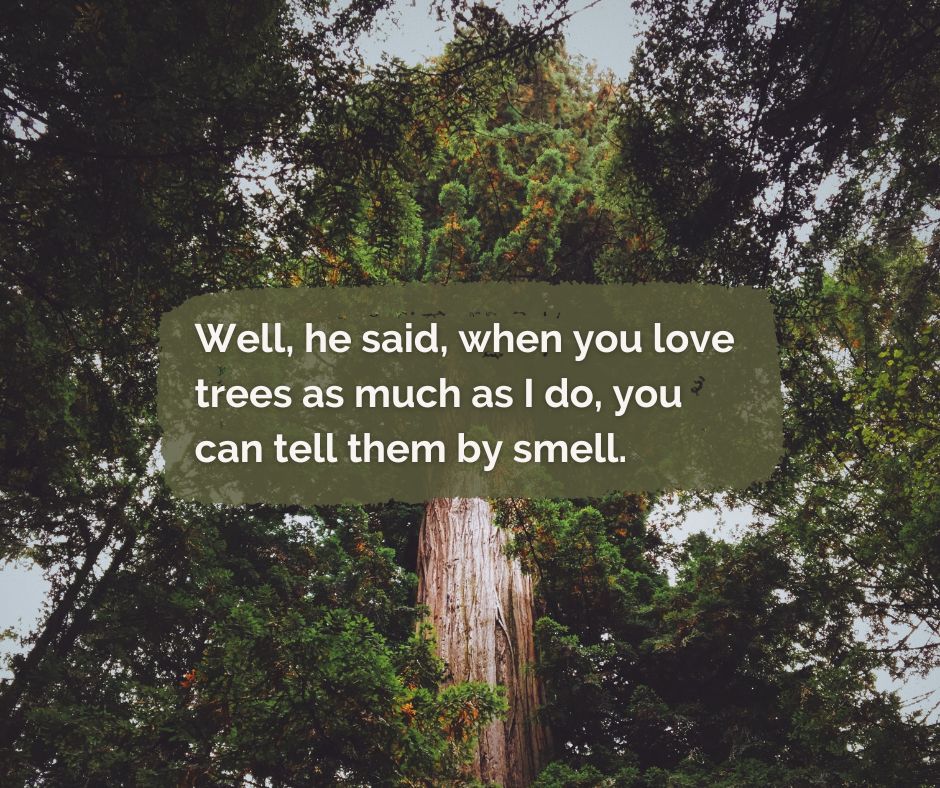What The Lover Sees

If you love it enough, anything will talk to you.
-George Washington Carver
The arborist had come with a crew of workers to lay a great ash to rest. While he was here, I asked him to cut out an old stump that was now in a space where a garden was taking shape.
The stump was old and decayed, the bark long dissolved. When it was sliced off and lying in the grass I asked the arborist, What kind of tree was that? To my surprise he knelt down on all fours and put his nose to the wood. An oak, he said, rising to his feet.
I chuckled slightly and said, And you can tell by smelling it? He reached down into the pile of shavings and came back with a fistful. He rubbed it like a chef chafing herbs in his palm to release their odor and flavor. He sniffed. Then he held up his palm. Smell that? I shook my head, having smelled only—what else?—half-decayed sawdust. Well, he said, when you love trees as much as I do, you can tell them by smell.
If you want to see something you must love it, spend time knowing it. “The lover can see, and the knowledgeable,” writes Annie Dillard in her essay, “Seeing.” And the lover can smell, can know by his nose.
All the mysteries of the heart are like this: they appear only to the lover, the one who spends hours and days in its presence. It is the secret to any deep and awesome knowing. We can know material things, facts and data through investigation, testing, judging, categorizing. But to know a son or daughter, a wife or husband, a true friend, we have to begin in love, and then the real person appears to us, almost as a revelation. It’s the same with trees, I now know. Stars. Rocks. Rivers. Food. Music. Sports. Art. In a word, God.
As the workers were cleaning up the site, I walked past the man running the chipper machine. He commented on the beautiful woods and the running stream. Do you ever find Indian artifacts here? he asked. The question surprised me, though I knew Lenape Indians had lived here. I said I hadn’t. Well, he said, it’s kind of my hobby, I go looking for them. I walk along streams like this. Or in a freshly plowed field after a rain in these parts. And you find arrowheads and spear points and hammer stones.
Suddenly I realized, There must be indigenous artifacts right here, beneath my feet. And this man was showing me how to love them, so that they might appear to me.
Brings back great memories of searching for arrowheads with my Dad when I was less than 10 years old in North Carolina (Cherokee). Thanks David
Your Dad was a lover–it’s great when Dads and Moms can share their love of something with their children. It’s a great gift, as you know.
I love this, David! Perhaps Trey could conduct one of his forest therapy sessions on your property. His message is all about openness and knowing in the presence of God’s nature.
Trey has led many forest bathing experiences here–he’s a favorite among retreat attendees. What people love is how Trey shares his love of the whole natural world–and it’s infectious.
I think: When I see something lovely, I’ll love it. And of course there’s truth in that. But then this other truth: only when I love something do I truly see it–that’s life-changing.
Dillard says something similar in Pilgrim at Tinker Creek: “Seeing is of course very much a matter of verbalization. Unless I call my attention to what passes before my eyes, I simply won’t see it. It is, as Ruskin says, ‘not merely unnoticed, but in the full, clear sense of the word, unseen.'”
Thank you, David. Even at 75 I can learn to love my people and the world I live in.
Right–that’s, I think, the most important thing to learn–that we love first, and then we see. As in, ‘Love me, and then you will see my beauty.’ It makes ‘perfect sense’ to find a beautiful person and then love that person, except it doesn’t work that way around, at least not after the rush of hormones or infatuation has subsided.
Absolutely beautiful; so true. Thank you, David.
Thanks for reading, Sally
Hello readers–I wanted to share a response I received from someone who messaged me this morning after reading the post. She writes:
“I loved your post today. Your quote from Annie Dillard reminded me that, when I was young, she was my playmate when I visited my grandfather outside of Pittsburgh. Our favorite thing to do was to climb trees.”
I asked if I could share her comments, and she was happy to have them posted. And, she added, “Her name then was Annie Doak, and we share the same godmother.”
I thought that was quite remarkable, and knew others who love Annie Dillard would enjoy hearing that story.